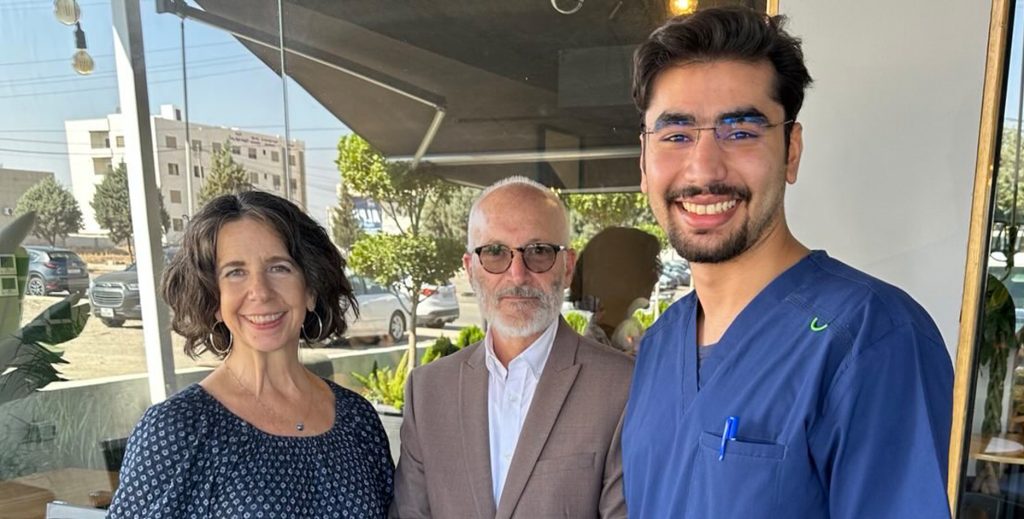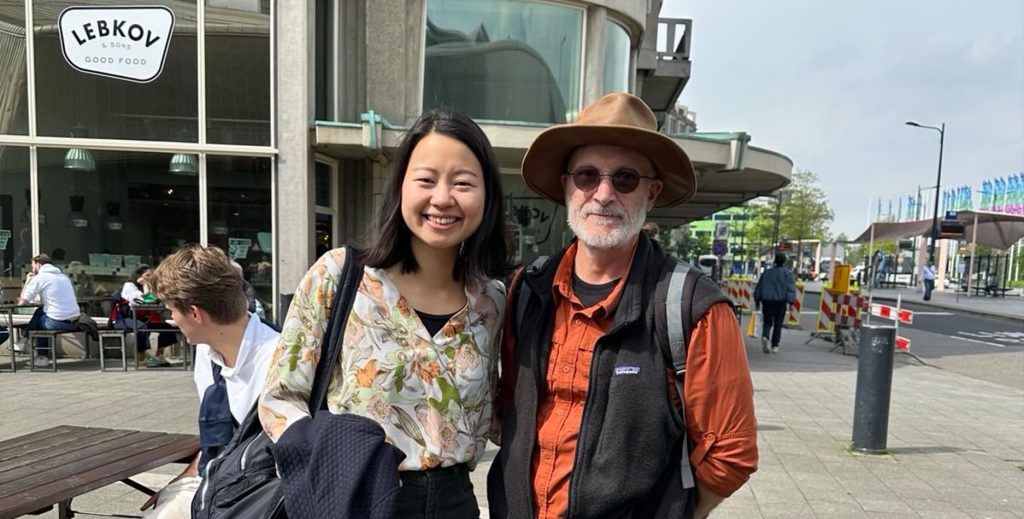Most Temple international students know and respect Dr. Martyn Miller, a hands-on assistant vice president of Global Engagement, who has met, helped and recruited many international students for Temple University.
While overseeing international services and cultural activities for Temple, Miller also assists with student recruiting and partnership development in the Indian subcontinent and in the Middle East and North Africa (MENA).
His MENA concentration matches his own background, beginning his early life in Syria and Lebanon where his father was an academic. Now, as a recruiter in the Middle East, he leverages his roots and proficiency in Arabic, to connect deeply to students.
He also has strong connections linking him to Temple. He has been here since 1999, and when he began working here, he discovered by chance that his paternal grandparents were once Temple professors.
His deep, Temple connection surprised him as, to some extent, did his own career path. Despite never imagining himself in his current career, originally studying English literature throughout undergraduate and graduate school at The University of Georgia, Miller has spent nearly 30 years in higher education administration, a journey which was a natural evolution of his background.
Although recruiting isn’t formally part of his job, nor the majority of what he does, Miller has been a successful recruiter at Temple, who bridges the gap between Temple and hundreds of international students. What’s his approach?
Recruiting Strategy
It may seem antithetical, but Miller admits that he doesn’t have a fixed approach to recruiting, and this is what differentiates him. “I tell the truth. My job is to help the student find the best university that they’re going to end up in. And that might be Temple, or it might be another school.”
“If I can convince somebody that Temple is the right place and that person comes here and increases our numbers, I’m happy. But I’m also happy if I can help the person identify that they would do better in a different type of school. I don’t want to bring somebody here and have that person have a miserable time.”
-Martyn J. Miller
Regardless of whether Temple seems to be the right fit, Miller is committed to finding the right home for each prospective student. It is this personalized approach that has made him successful. Rather than viewing a student as a number, Miller views each student for who they are. He sees prospective international students as young people attempting to figure out their lives.
Illustrating that point, Miller said, “One of my longest conversations with a prospective student was three days long, and that young woman at the end said, ‘I’m not going to go to Temple, but I want you to know that you taught me more in these conversations than anybody else has taught me.’”
Connecting with Students
The benefit of Miller’s personalized approach is the relationships he builds with students. On a recruiting trip to Jordan in October 2023, Miller was leaving a café when a young man approached him and asked if he spoke Arabic. Miller said, “Yes.” The young man then asked if he was from the U.S. Miller again said, “Yes.” He continued and asked if Miller was from Pennsylvania, which Miller affirmed. And then the student asked if he was from Temple, to which Miller replied with another, “Yes.” Finally, the young man asked if he was Martyn Miller, which Miller confirmed.
The young man then informed Miller, “I was a student at Temple’s Intensive English Language Program and you’re the one that got me to Temple years ago.” That Kuwaiti man is now a medical student completing his residency at a hospital in Jordan.

Another story Miller told was of a recruiting trip to Kuwait in 2014 where he met a Kuwaiti girl who had recently returned from the United States. She was in the U.S. to study but faced difficulties and was searching for another school. Her father mentioned that he wanted to find a school in the United States for his son as well.
In Miller’s words, “The end of the story is that she already has graduated from Temple and is currently working in her field in Kuwait, and her brother will graduate this upcoming semester (Spring 2025).”
Responding to the changing world of recruiting
According to Miller, recruiting has become much more cutthroat and less humane, particularly between institutions. With a combination of dwindling enrollment from domestic students (less students and fewer opting for university) and continuously decreasing funding from state governments, U.S. universities are feeling the pressure to fill those empty seats. One way to accomplish this is by recruiting international students, and of course, international students add to the college experience for all students.
Miller stressed how important it is to develop a connection with prospective students. Unfortunately, many recruiters are pressured to recruit as many students as possible, but for Miller, keeping in mind the long-term goal of providing a path forward for these students is equally important.
“If I can convince somebody that Temple is the right place and that person comes here and increases our numbers, I’m happy. But I’m also happy if I can help the person identify that they would do better in a different type of school. I don’t want to bring somebody here and have that person have a miserable time,” he said.
And from the many students Miller has recruited, his personal strategy is, clearly, a winning one for Temple, too.
U.S. lack of a unified international recruiting approach
Miller explained that unfortunately, the United States lacks a national strategy for attracting international talent even though, “According to the latest data released by the U.S. Department of Commerce’s Bureau of Economic Analysis (BEA), education-related travel exports were valued at $50.2 billion and ranked 7th among service exports in 2023.” NAFSA: Association of International Educators also points to the fact that international students not only contribute financially to the U.S. economy, but they also support tens of thousands of U.S. jobs.

According to Miller, other comparably developed nations have ministries of higher education and dedicated government bureaus tasked with assisting international students and assisting institutions to recruit those students. The U.S. lacks this, and universities have been left to their own devices to promote the United States as a higher education destination.
In 2016, Temple University responded by creating the “You are Welcome Here (#YAWH)” campaign to remind international students that they are wanted. The campaign became so successful that NAFSA, a key global industry association, adopted the campaign and promoted it nationally. The #YAWH campaign, and the scholarship associated with it, continues to this day, and Temple still participates.
In 2019, Temple also led a “WhyUS?” campaign about the strengths of studying in the U.S. for international students. Currently, Temple distributes #WhyUS scholarships that international students compete for by submitting an essay, artwork or video explaining why they want to come to the U.S. and Temple.
In 2023, Temple became one of the leaders of the “Think Philly“ campaign, establishing Philadelphia as a global education hub where international students can “learn, live and thrive.” Temple is working on this campaign with a broad coalition of colleges, universities, nonprofit organizations, civic and governmental agencies, all with the shared vision of promoting Philadelphia as a study destination for international students.
Also, individual government agencies are promoting their own campaigns. Such campaigns include Come #StudyWithUS! from the Department of State’s EducationUSA, USA: A Study Destination from the International Trade Administration, and Study in the States from the Department of Homeland Security.
“You’ve got three different agencies working on three different campaigns, and then you’ve got the U.S. Department of Education that offers its help to each campaign but doesn’t do anything on its own,” said Miller.
To try to create a more centralized approach, several agencies, including some U.S. government agencies, created the U.S. for Success Coalition, whose goal is “to position the United States to effectively compete and cooperate on a global stage by attracting top talent and ensuring the success of all international students.” Still the government does not have one central governing policy.
Miller pointed out that until a central government agency takes control, U.S. recruitment numbers for international students will continue to suffer from a lack of cohesion and an inability to cooperate.
He underlined a sentiment that is shared broadly across the field, “We’re all going to succeed together, or we’re all going to fail together.”
By Massin Larbi, CLA ’25, Global Engagement writing intern
Photos provided by Martyn J. Miller

